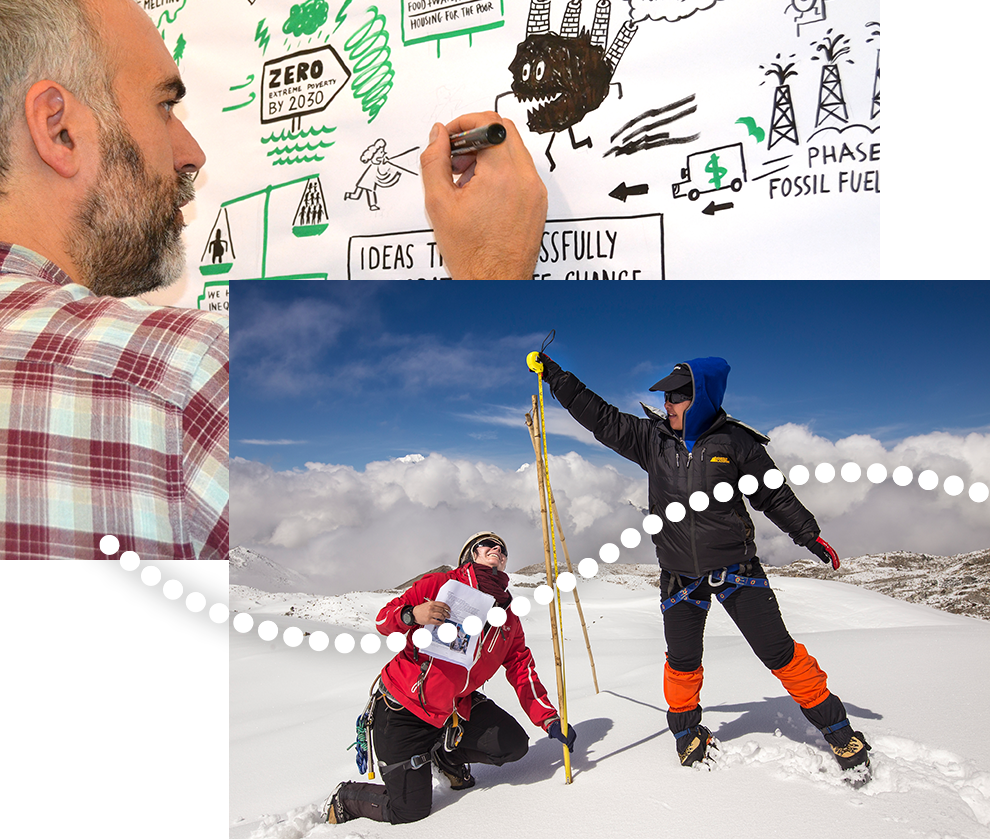Adaptation Futures 2023

Introduction
The Adaptation Futures Conference series is the premier international conference devoted entirely to climate change adaptation, bringing together researchers, policymakers, practitioners, industry representatives and communicators to present their work in adaptation, learn what others are doing, and build networks.
Adaptation Futures 2023 will see more than 1500 members of the climate change adaptation community from around the world gather in Montreal to share their knowledge on the challenges and opportunities of adaptation.
180 sessions, master classes and field visits will address themes such as migration, habitat, coasts, fisheries, agriculture, water, energy, finance, education, nature-based solutions, local and indigenous knowledge, equity and justice and more!
The following are a list of sessions hosted/co-hosted by Adaptation Without Borders. To attend, see the registration link and access the full programme for more details.
This text is from the Adaptation Futures 2023 website. Please access the original text for more detail.
Session 211: Do we need a Global Goal on Adaptation?
Wednesday 4th October, 8:30-10:00 (EDT)
The Paris Agreement (Article 7) established a Global Goal on Adaptation (GGA) of “enhancing adaptive capacity, strengthening resilience and reducing vulnerability to climate change” while contributing to sustainable development and meeting the temperature goal. Many challenges and questions emerge from the GGA framing and the Global Stocktake mechanism established to review progress towards it. These questions refer to the collective willingness to move towards a more precise definition of the GGA, assessment methods and means, sources of information and aggregation, temporal scales to consider, governance processes of monitoring and evaluation, and linkages with global and local justice and equity (1,2,3).
The goal of this session is to facilitate the co-production of a nuanced narrative on the benefits and dangers, and – opportunities and trade-offs (and for whom), of the Global Goal on Adaptation framing.
AWB speaker/participant: Alexandre Magnan, IDDRI, France.
Session 464: Effective adaptation: What is it and how can we measure and manage it?
Wednesday 4th October, 16:00-17:30 (EDT)
The proposed session is organized by the UN-led World Adaptation Science Programme (WASP), which is one of the four pillars of the World Climate Programme. WASP’s core vision is ensuring that climate adaptation knowledge gaps are filled to inform evidence-based policies, solutions and actions for successful adaptation to new climate conditions.
This session intends to conduct an open consultation with the wide adaptation community on the critical issue to address adaptation effectiveness, focusing on adaptation guidelines, metrics and toolkits currently in practice and in development at project, national, regional, and international levels, including vulnerability indexes.
The outcome of this session will contribute to the upcoming WASP science for adaptation policy brief on the topic, to be launched at the COP28. We also hope the discussion and outcome will help move forward the research agenda and policy process around this topic, informing IPCC, UNFCCC, GEF and GCF, the funding organizations of the WASP.
AWB speaker/participant: Alexandre Magnan, IDDRI, France.
Session 498: Strengthening supply chain resilience and risk ownership in the face of transboundary climate impacts on trade
Thursday 5th October, 14:00-15:30 (EDT)
This session will draw on emerging and important insights from several areas of work on this subject, including GIZ and GEPA’s work on the implications of climate change on fair-trade value chains and potential solutions of how to address them, the UN Global Compact Think Lab’s work on just transition and supply chain resilience, and more in-depth assessments by the Irish Environmental Protection Agency, ICARUS and Maynooth University on transboundary climate risks and potential impact for Ireland. Together, the insights emerging from these findings provide a compelling overview of transboundary climate risks and their consequences on both global and local economies, as well as highlight the barriers and opportunities in time of pressing policy demands.
The session organisers invite participants to explore and discuss the interlinkages and shared risks for value chain actors, main barriers and potential opportunities and concrete approaches for solutions to climate-proof a supply chain.
Authors and Partner organisations:
- Stockholm Environment Institute (SEI) / Adaptation Without Borders
- Deutsche Gesellschaft für Internationale Zusammenarbeit (GIZ) GmbH
- Global Shea Alliance
- Irish Climate Change Advisory Council Secretariat and Irish Climate Analysis and Research UnitS (ICARUS) at Maynooth University
AWB speaker/participant: Mikael Allan Mikaelsson, SEI.
Session 124: Adapting to Transboundary Climate Risks: Regional Perspectives and Actions
Thursday, 5th October, 16:00-17:30 (EDT)
In our interconnected world, the impacts of climate change, adaptation or mitigation actions within one country can create risks to food security, trade and economic sectors in another – and can influence the adaptation options of other countries. We call these, collectively, ‘transboundary climate risks’ (TCRs).
Scientific evidence, as summarised in IPCC assessments, has long recognised that climate change impacts could cross national boundaries. However, while multi-country mitigation efforts were established through the United Nations Framework Convention on Climate Change, coordinated international action on adaptation has been slower: it has historically been treated as a local to national concern. Momentum is growing to explicitly investigate not only the transboundary risks associated with climate change, but also risks resulting from adaptation at different scales.
This knowledge exchange session explores the implications of TCRs for adaptation planning, and the role that regional organisations can play in strengthening cooperation on adaptation and managing cross-border and cascading climate risks through regional adaptation plans. It exchanges knowledge about policy and actions to manage TCRs unfolding in the Sahel and in Europe, as well as other regions around the world. The session will do this by drawing on the experiences of three initiatives – the programme Supporting Pastoralism and Agriculture in Recurrent and Protracted Crises (SPARC), the project Cascading Climate Risks: Towards Adaptive and Resilient European Societies (CASCADES) and the global partnership Adaptation Without Borders (AWB) – as well as knowledge exchange with the audience.
AWB speakers/participants: Katy Harris (SEI); Sarah Opitz-Stapleton (ODI); Emmanuel Seck (ENDA and SPARC)
Session 553: How to embed justice in climate change practices. Dialogue on global urgencies and local practices
Friday, 6th October, 8:30-10:00 (EDT)
The IPCC (Intergovernmental Panel on Climate Change) Sixth Assessment Report (2022) highlights for the first time justice as a core element of climate change adaptation, alongside effectiveness and feasibility. Recent development in policy also reflects the growing awareness and need of justice considerations in adaptation planning and action, Just resilience is for instance one of the key principles in the recent European Union Climate Adaptation Strategy (2021). We are grappling with the clear need to transition our societies away from our current unsustainable trajectories. This demands significant social change. Striving for transitions that are more just requires us to re- organise the way we adapt and mitigate.
Vulnerable people and systems often have less capacity and capabilities to adapt and are the least likely to be heard, recognised and prioritised in adaptation processes, resulting in fewer benefits from adaptation actions. The lack of justice considerations and due processes can also result in ‘maladaptation’ resulting in redistribution of burdens or even enhancing risk for regions or groups. This is daunting, especially considering that those disproportionately affected have often contributed the least to causing climate change in the first place.
The aim of this session is to bring together experiences and approaches on how to embed justice in global and local climate change practices. We could learn a lot from the overarching concepts of climate justice.
AWB speaker/participant: Frida Lager (SEI)

(0) Comments
There is no content